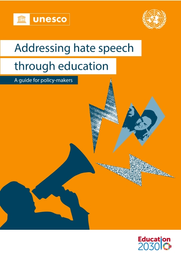العودة

How can countries worldwide tap into the power of education to counter hate speech online and offline?
المنشورات
2023 - 04 - 17
A New Comprehensive Guide to Combating Hate Speech Through Education

UNESCO and the United Nations Office of the Special Adviser on the Prevention of Genocide (OSAPG) have jointly developed the first guide providing policy-makers and teachers with practical recommendations for strengthening education systems to counter hate speech. The guide offers a range of ideas, including: equipping teachers to become agents of change, promoting civic education and critical thinking, using education to promote respect for diversity and human rights, and fostering intercultural dialogue and mutual understanding.
Educating people on the difference between (rather harmless) insults and hate speech can help protect their freedom of expression while also encouraging respect and understanding. Learning how to draw the line between the two can help individuals recognize the consequences of their words and actions on others and prevent the spread of hateful narratives. Educational institutions should not restrict learners' freedom of speech, but instead foster an environment where respect and understanding are prioritized, allowing learners to express their opinions without the spread of hateful narratives.
What are the ways to spot and counter hateful narratives within curricula?
Learners should be encouraged to discuss and examine one-sided narratives that fuel hate speech and justify exclusion which are prevalent in many subject areas and educational programmes. It is important to recognise the damaging effects of these narratives and to take action to counter them.
Facilitating difficult conversations about discrimination, breaking down stereotypes and prejudice, and recognising the trauma and stigma caused by violence are all necessary components of teaching and learning about social inequality and power dynamics. Revising and reviewing curricula and educational materials can help to make learners more aware of the various types of discrimination that still exist in the world today, as well as the mechanisms that lead to violence in societies.
How can teachers create an alternative sense of belonging?
In order to create an effective learning environment, it is critical to prioritize establishing a safe, nurturing, inclusive, and collaborative classroom atmosphere. Unfortunately, hatred can be attractive to some, as it can provide a false sense of purpose and connection. To counter this, it is essential to invest in fostering a sense of community in and out of school settings, as well as including diverse perspectives in the educational process.
Programmes that promote Global Citizenship Education (GCED) and encourage collaboration, as well as inclusive and culturally-sensitive practices can assist in building the required understanding and competencies to accept diversity and engage respectfully in a multicultural society. Social and Emotional Learning (SEL) provides teachers with practical methods to help create a sense of belonging amongst learners. Through using case studies and real-life examples to debate contentious topics and different perspectives, learners can learn to manage stress and negative emotions, recognise their strengths and weaknesses, and resolve disputes.
For more information:
أحدث المنشورات
القائمة الكاملةاليونسكو
المستقبل على المحك: لماذا الاستثمار في التعليم أمر بالغ الأهمية؟
يسلط هذا التقرير، الذي أعدّته اللجنة التوجيهية الرفيعة المستوى المعنية بالهدف الرابع من أهداف التنمية المستدامة (SDG4) بالتعاون مع الشراكة العالمية من أجل التعليم (GPE) ونُشر في عام 2024، الضوء على الحاجة المُلِحّة لتعزيز الاستثمار في التعليم كوسيلة أساسية لمواجهة التحديات العالمية، بما في ذلك تغيّر المناخ، والتطورات التكنولوجية، والتحوّلات الديموغرافية.
اليونسكو
المدن العربية تتألق في جوائز مدن التعلم لليونسكو لعام 2024
تُحرز المدن العربية تقدمًا كبيرًا في مجال التنمية المستدامة والتعلم مدى الحياة، مع تركيز متزايد على إنشاء بيئات تعليمية شاملة تُسهم في تحقيق الأهداف التنموية المحلية والعالمية. وقد احتفلت جوائز مدن التعلم لعام 2024، التي تُمنح من قِبَل اليونسكو، بهذه الجهود، مبرزةً المدن العربية التي تميزت في بناء مجتمعات تعليمية.
اليونسكو
مؤتمر اليونسكو العالمي الثالث للموارد التعليمية المفتوحة: تعزيز الوصول الشامل إلى المعرفة
انطلق مؤتمر اليونسكو العالمي الثالث للموارد التعليمية المفتوحة (OER) في 19 نوفمبر/تشرين الثاني 2024، في مركز دبي التجاري العالمي في دولة الإمارات العربية المتحدة، ليكون المرة الأولى التي يُستضاف فيها هذا الحدث في العالم العربي. نظّم مؤتمر اليونسكو بالتعاون مع مؤسسة محمد بن راشد آل مكتوم للمعرفة (MBRF)واستقطب أكثر من 500 مشارك ومشاركة من نخبة القادة العالميين، وصنّاع السياسات، وممثلي المؤسسات التعليمية، بما في ذلك وزراء، وأكاديميون، وخبراء من القطاع الخاص. وتركّزت المناقشات على مدار يومين حول تعزيز الاستفادة من الموارد التعليمية المفتوحة والتقنيات الناشئة، بهدف تحقيق وصول عادل وشامل إلى التعليم، وتقليص الفجوة الرقمية على الصعيد العالمي.
اليونسكو
الأمم المتحدة تحتفي في شهر ديسمبر/كانون الأول بحقوق الإنسان، والأشخاص ذوي الإعاقة، واللغة العربية
تُحيي الأمم المتحدة في شهر ديسمبر/كانون الأول ثلاث مناسبات بارزة تُعنى بحقوق الإنسان، وبحقوق الأشخاص ذوي الإعاقة، وباللغة العربيّة، ممّا يجعل هذا الشهر فرصةً عالميّةً للتفكير والعمل. وتقود اليونسكو الجهود لتعزيز التعليم الشامل، وحماية حقوق الإنسان، والاحتفاء بالإرث الثقافيّ واللغويّ للّغة العربيّة، من خلال سلسلة من الفعاليات والمبادرات.